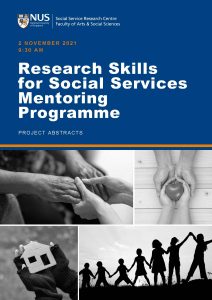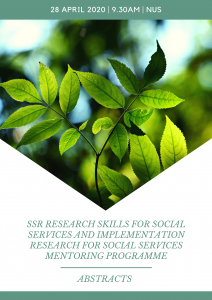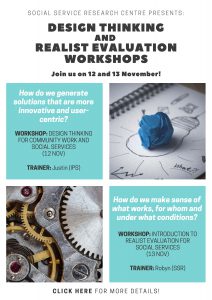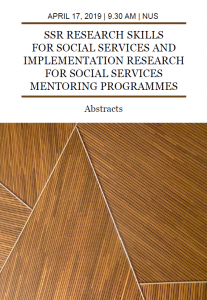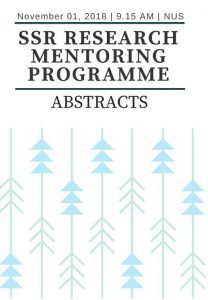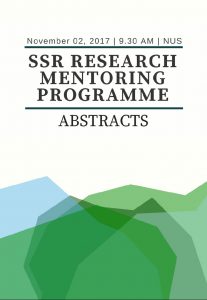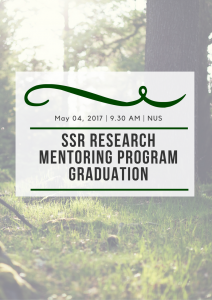Training Programmes

Short Course Registration
Interested applicants can register for SSR Short Courses via NUS L3AP Portal.
Upcoming Short Courses
Participatory Research for Social Services (Mar 2026)
This course provides an overview of participatory research designs and methods that can be applied to social and community services. Participatory research is distinct from other research approaches in its focus on engaging service users and ordinary people to be actively involved in decisions that shape the research or services that affect them. People’s participation in decision-making processes allows them the opportunities not only to voice their views, but also to have those views considered and incorporated into research and service designs. Participatory approaches place all stakeholders on level-playing ground and encourages users, service providers, researchers, policy-makers and other members to collaborate, share and co-own research that provides more effective solutions and services for users.
At the end of the course , participants are expected to achieve the following objectives:
• Understand the principles, values and rationales behind participatory research.
• Understand the different participatory research designs and methods, as well as their strengths and limitations.
• Suggest ways to carry out participatory research for social services.
Date
30 Mar 2026
Time
9:00AM – 6:00PM
Venue
NUS Kent Ridge Campus (The Shaw Foundation Building, Block AS7)
Trainer
Dr Hana Alhadad
Survey Design and Analysis (Apr 2026)
This workshop will provide learners with essential knowledge and practical tips for designing surveys and analysing survey data. The structure of the workshop will mirror key steps taken when conducting a survey. Examples that are relevant to the social service sector will be used to illustrate key concepts and common challenges faced. Learners can look forward to opportunities for class/group discussions and hands-on practice.
This workshop aims to equip learners with practical tips in survey design and inappropriate practices. Learners will also learn to manage and analyse data obtained from surveys.
Date
22 Apr 2026
Time
9:00AM – 6:00PM
Venue
NUS Kent Ridge Campus (The Shaw Foundation Building, Block AS7)
Trainer
Mr Tan Zhi Han
Effective Use of Theory of Change for Social Services (May 2026)
This course on theory of change introduces participants to the theory-driven family of evaluation approaches and highlights the importance of making explicit the theory underlying any policy, programme or intervention as a basis for planning, implementation as well as monitoring and evaluation. A theory of change explains how the activities undertaken by a policy, a programme or an intervention contribute to a chain of action that leads to the intended outcomes. A theory of change is also a diagrammatic representation of a programme blueprint – it makes explicit the inputs, the activities, the outputs and the outcomes, and the links between them. Through this approach, the precise link between activities and the achievement of outcomes are more fully understood. With a detailed understanding of how change take places, the theory of change can potentially provide analytical insights into programme design at the planning stage. It can be useful for studying programme processes or implementation, as well as for identifying programme outputs and outcomes for monitoring and evaluation.
At the end of the course, participants are expected to achieve the following objectives:
• Understand the role of theory underlying policies, programmes and/or interventions.
• Understand the key concepts of theory of change and the analytical insights it can potentially provide to programme planning, implementation, monitoring and evaluation.
• Learn how to develop and appraise theories of change through the use of case studies.
Date
May 2026
Time
9:00AM – 6:00PM
Venue
NUS Kent Ridge Campus (The Shaw Foundation Building, Block AS7)
Trainer
Dr Robyn Tan


